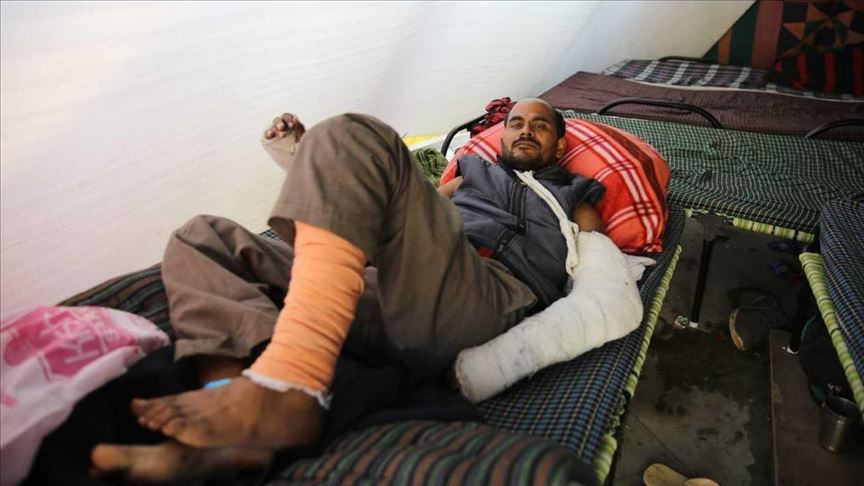Families hit by India riots seek refuge in Delhi camps
More than 800 occupants who lost their homes in riots are already in relief camps as more continue to arrive

NEW DELHI
Haseena Begum, who was displaced after her home in New Delhi’s Shiv Vihar district was looted in recent riots, was crying as her 7-person family had nowhere to go.
They were living in a locally run hospital till Wednesday, when the hospital authorities asked them to vacate. Since then the 56-year-old woman could not even find a bed at a local refugee camp.
“Where will I go with my elderly in-laws? My mother-in-law is 77 and my father-in-law is 86. They are already worn out with all that has happened with us. Now, where should I go with them?” she said.
Even as those affected by the communal riots in India's capital continue to throng relief camps, many of them like Haseena are being turned away for want of space.
At the Mustafabad Idgah camp in northeast New Delhi, 816 people have registered so far, according to the Delhi Waqf Board.
On Wednesday, when Anadolu Agency's reporter visited the camp, volunteers were making announcements asking people to find alternatives as the camp was overcrowded. Many were being turned down due to the unavailability of beds.
The Idgah relief camp, run by the local government, is the largest of nine relief camps being run in the city. Many privately run relief camps are also helping those who have lost their homes or are afraid to return home. In the past week, the camps have received mattresses, medicine and food donated largely by charitable organizations.
Doctors are volunteering to provide medical attention to the majority of the people, who are suffering from skin rashes and the common cold. Legal teams from various human rights networks are providing legal assistance to the victims. Student volunteers from universities in New Delhi are visiting the camp to help victims fill out documents for compensation or forms for lost identity documents.
“We recognize the whole human race as one. The idea here is to help the people, irrespective of their religion,” said Puneet Singh, a member of the Khalsa Aid organization, which distributed carts to vendors and helped repair burnt and looted shops.
- Fateful Day
Mohammad Nizamuddin has been away from home for two weeks now. The 38-year-old and his wife managed to find beds at the Idgah relief camp, but everything else they owned was either set on fire or looted. With both arms fractured and a plastered leg, he is still in shock over losing his younger brother in the riots.
On the fateful day of Feb. 27, Nizamuddin returned to his home in northeast New Delhi with his entire family, which included his younger brother Jamaluddin’s family, after attending a wedding in his hometown in Uttar Pradesh. Not much aware of the riots, he entered his street, where a mob grabbed both men and attacked them with batons and swords.
“It was around 5 p.m. when a mob of around 40 people attacked us. After a few minutes, both of us fell unconscious. I do not remember clearly but was later informed that we laid there for over two hours until the police came at 7:30 p.m. to take us to the hospital,” said Nizamuddin, who worked as a daily wager and supplied groceries.
At the New Delhi-government run Guru Tegh Bahadur Hospital, Jamaluddin, 35, was pronounced dead on arrival. He left behind a wife and four young children.
Nizamuddin meanwhile suffered severe injuries and will take almost a year to recover. Both of his elbows and arms have been fractured and have been fitted with metal implants and screws. He received 40 stitches in his left leg, which is also plastered. He also suffered severe blows to his head, due to which he feels dizzy on most days. His wife, Parveen Begum, and their three children have been taking care of him since.
As Nizamuddin lies on a bed in one of the tents at the relief camp, he worries over his children’s future and the overall attitude towards Muslims in the country.
“We have lived all our lives here. There never was any hatred among people. But in the last couple of years, we have seen a tremendous change in how we are treated as a minority. We have observed a change in attitude even among our neighbors. This is not the life I want for my children.”
While addressing parliament on Wednesday, Home Minister Amit Shah assured that there will be no action against any innocent people.
He added that 49 cases of the Arms Act have been registered and 153 arms have been recovered, while over 650 meetings of the peace committee have taken place since Feb. 25 and a total of 2,647 people have been detained or arrested for violence in New Delhi.
At least 53 people were killed and more than 200 others were injured during the week-long communal riots in the Indian capital that begins on Feb. 23.
Anadolu Agency website contains only a portion of the news stories offered to subscribers in the AA News Broadcasting System (HAS), and in summarized form. Please contact us for subscription options.






